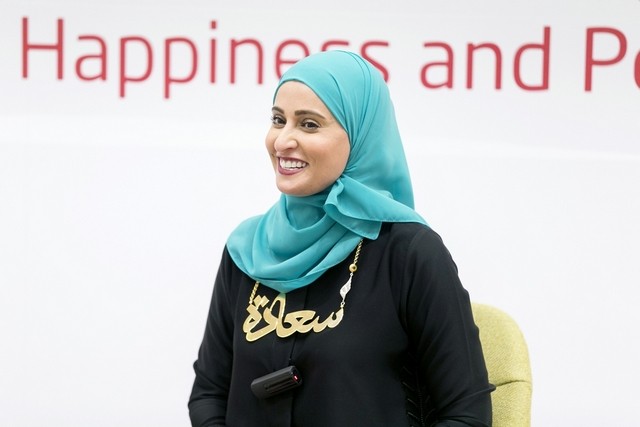
Congratulations on your new post!
After reading your article ‘A Quantum of Happiness’, it’s clear you have profound understanding of the concept of happiness… it’s also evident you have a huge task ahead of you.
That’s not to say the UAE hasn’t fared well in past global rankings of happiness. This year the Emirates ranked 28th on the 2016 World Happiness report. Closer consideration of any global measure of happiness (including the World Happiness Report, the European Happiness Equality Index or the OECD Happiness Report), makes it easy to understand why the UAE does so well in this regard. Whether it is residents’ access to quality healthcare, housing and education, people’s ability to get help from the police and trust in governmental institutions or just the sophistication of this country’s infrastructure and interconnectivity, the ingredients to a happy society are already a part of the UAE resident’s everyday life – and we have the research to prove it.

Last year, OMD UAE, a marketing performance company within our group, conducted a survey titled ‘The Future of the UAE.’ It surveyed more than 2000 citizens and residents and the feedback was consistent: 82 percent said they felt extremely confident and positive about the future of the UAE. The opportunity the UAE provides its people with regards to equality, career growth, civic engagement and safety significantly contributed to the residents’ sense of happiness. More than 90 percent of the people surveyed said they believed their standard of living will improve in the next two years. Freedom of choice, equality between genders and the ability to become rich were the top three factors the residents said contributed to their contentment.
There’s so much that the UAE does well. Considering the actions the leadership of the country has set in motion, we have no doubt that this will continue to get better. In fact, as the majority of UAE residents are economic migrants and working professionals, perhaps one of the easiest ways to impact residents’ happiness is to bring the happiness agenda into the corporate world.
OMD’s study found that 83 percent of UAE residents admit to being concerned about their work-life balance. That’s a statistic significantly higher than the global averages (32 percent, 45 percent and 61 percent are the averages for Australia, USA and Singapore respectively).The UAE’s labor law already does a lot to ensure corporations don’t compromise the happiness of employees in their pursuit of profit. Still, there’s still a few ways employers can go above and beyond to ensure their employees are happy and productive.
From my experience as a working professional in the Emirates for the past two and a half decades, here are five suggestions to successfully make happiness part of corporate UAE:
#1. Greater flexibility to have a real work-life balance: Considering the earlier mentioned statistic regarding working professionals’ concerns, we could adopt policies to increase maternity and paternity leave, pay for overtime or part time work, or even follow in the footsteps of nations who’ve made it illegal to expect employees to reply to emails after working hours?
#2. Encouraging employees to take time out for themselves: We have found that giving employees a day off to move houses or celebrate their birthday is a great way of institutionalizing an attitude of self-care. Also, having a day where employees can volunteer at a charity of their choosing helps inculcate a greater sense of purpose and community within employees.
#3. Requiring employers to create or participate in wellness programs: The UAE has a problem with diabetes, hypertension, obesity and cardiovascular disease. The main culprit? Sedentary lifestyles and stress. Having unhealthy employees costs UAE employers a lot in the form of high health insurance premiums. So what can be done? Employers should prioritize employee wellness by making it compulsory for companies to create a employee wellness program or opt into a nation-wide health program created by the government. While it maybe seen as an additional cost, there is a significant pay off. Since we introduced our own wellness program, we’ve found our health care bills and insurance premiums dropped as did the number of days our employees called in sick.
#4. Encouraging more businesses to become sustainable: There is a lot that can be done to ensure companies embraces greater sense of transparency and accountability in their actions. We’ve worked with the Global Reporting Initiative over the past couple of years and it has really helped shape up our thinking and attitude towards corporate governance and ethics, shared values, innovation and thought leadership.
#5. Creating a nation-wide corporate happiness index: Perhaps the best way for companies to stay on track and top of the happiness agenda would be to make it an official requirement. As a company we’ve been participating in the Great Places To Work annual review over the past five years and it’s really helped take a systematic approach to measuring and improving our employees’ happiness – perhaps others companies could benefit from a similar audit? Creating a nation-wide corporate happiness index could be a good way to standardize and track our communal progress. We could even work on creating an app which would be linked to employees’ visa numbers — this would allow the government to objectively track happiness levels across companies.
As someone who has lived in the UAE happily for the past 20+ years, I applaud you and the leadership of this fine country for what you have started. The kind of opportunities I’ve had in the Emirates has given my family and me a lifetime of prosperity. With happiness part of the national agenda now, I know there will be so many others who will share my experience and opinion in the years to come.
This article was originally published on LinkedIn Pulse.



